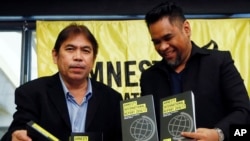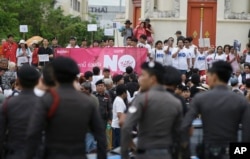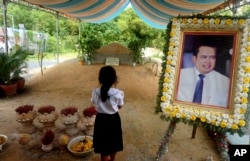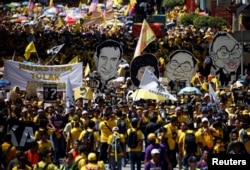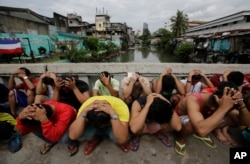Amnesty International says Southeast Asia faces ongoing human rights challenges with activists and civil society targeted by governments amid ongoing failures of accountability by security forces.
In its latest annual report, covering 159 countries, Amnesty warns of a "shrinking civic space" across Asia and the Pacific, as authorities invoke a range of repressive laws to criminalize peaceful expression.
Champa Patel, Amnesty International’s director for Southeast Asia and the Pacific, said governments in targeting activists are "choking dissent."
"Across Malaysia, Thailand, Vietnam, Cambodia and Laos, people have been relentlessly threatened, arrested and prosecuted for peacefully exercising their rights to freedom of expression and assembly," Patel said.
The report said globally divisive politics has also been marked by governments turning on refugees and migrants.
Backing the Amnesty report, Sam Zafiri, a representative from the International Commission of Jurists (ICJ), said for Southeast Asia there has been "an erosion of respect for rights especially in areas of civil society and political rights."
Zafiri pointed to a global trend toward "authoritarianism and fear mongering," and growing concerns over government responses to terrorism threats. He also pointed to the decline in U.S. influence over the past decade.
Myanmar
Amnesty International said Myanmar faced reversals in human rights despite the democratically elected government led by Aung San Suu Kyi coming to power in early 2016.
Patel said the reversals include the harassment of rights activists and military operations in western Rakhine State against Muslim Rohingya.
Myanmar security forces mounted a major sweep through the region after an attack in October on guards at a checkpoint by suspected Rohingya attackers.
"In Myanmar, tens of thousands from the systematically discriminated against Rohingya community were yet again forced to flee their homes after enduring human rights violations that may amount to crimes against humanity," Patel said.
Former Myanmar political prisoner Bo Kyi said the Myanmar government, while facing several challenges, believes the rights picture is more mixed.
"Some areas are improving but many areas are still not improving because of [conflict] in the country — in Kachin State and Shan State and [illegal] land grabbing cases are still happening," Bo Kyi told VOA.
The Suu Kyi led government released dozens of political prisoners early last year. But Bo Kyi, a member of the Assistance Association for Political Prisoners (AAPP), said 86 prisoners of conscience remain in jail, with 200 others facing charges.
Cambodia
In Cambodia, Amnesty warned of a crackdown on the rights of freedom of expression, association and peaceful assembly had “intensified” in the lead up to elections in 2017 and 2018.
These have included tighter laws governing elections and harassment of those in civil society.
Amnesty accused Cambodian authorities of misusing the justice system and the punishing of civil society and the silencing of critics. In July Kem Ley, a political analyst, was shot in broad daylight amid charges of government links to the murder.
International Federation for Human Rights (FIDH) secretary general Debbie Stothard said respect for human rights in South East Asia has been under challenge over the past year. The outlook, she said, is “very grim”.
"Not only are people being prosecuted and persecuted through very, very unjustified charges, there are also people being threatened with death and being beaten up and being tortured for speaking out," Stothard said.
"These repressive governments are doing this so that civil society and people standing up for human rights and freedom of expression will be intimidated into silence," she told VOA.
ICJ’s Zafiri agreed. "Several countries like Thailand, Cambodia, Malaysia, and the Philippines, — we’ve seen a really disappointing decline in respect for rights," he said.
Malaysia and Thailand
In Malaysia, rights activists raised concerns after a court this week convicted an activist, Lena Hendry, for her role in a private screening of a documentary on the conflict in Sri Lanka a decade ago, "without Malaysian censorship board approval." Hendry faces a possible fine and jail term.
The Amnesty report said Malaysia had also witnessed an ongoing crackdown on rights to freedom of expression, peaceful assembly and association.
The report said the military authorities in Thailand had further restricted human rights, marked by the banning of peaceful political dissent, whether through speech or protests.
Amy Smith, a director with rights organization, Fortify Rights, said rights defenders themselves have been targeted by authorities.
"In Thailand we’re seeing human rights defenders and community based activists that continue to be targeted by the government just for their involvement in legitimate activities," Smith said.
"So anyone who speaks out, they’re being summoned by the military for attitude adjustment by the military. This is the climate of impunity in the region that is pervasive," she said.
Vietnam, Philippines and Indonesia
In Vietnam, the Amnesty report pointed to ongoing restrictions on rights to freedom of expression of association and of peaceful assembly. "Prisoners of conscience were tortured and otherwise ill-treated, and subjected to unfair trails."
Public demonstrations were also repressed with participants and organizers arrested and allegedly tortured.
The report said the Philippines has been marked by the “war on drugs” under the government of President Rodrigo Duterte that has left 7,000 people killed by authorities and vigilantes.
In Indonesia, Amnesty said despite a commitment to resolve past cases of human rights violations, there continued to be "reports of rights violations by security forces, including unlawful killings and the use of excessive or unnecessary force."
ICJ’s Zafiri says while he remains "optimistic" of long term improvements, the region’s immediate outlook remained challenging.
"What worries me now is that we’re actually seeing governments just even challenging the relevance of human rights to improving their societies," he said. "And that’s certainly something that suggests a weakening of this global legal framework that we worked so hard to create and establish."




